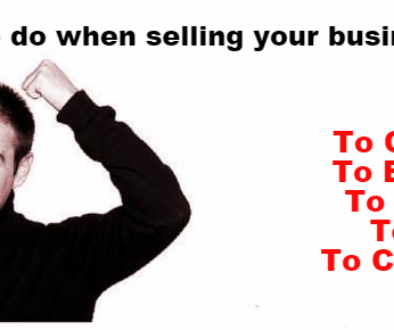Selling Your Business? Don’t Let Anyone Know!
Family and private businesses are sold in an environment that is unlike the selling environment of anything else you can imagine!
Sound surprising? After you review the following ten reasons that make selling a business different, perhaps you will agree.
(1) Confidentiality
Making the decision to sell one’s business is a difficult enough task in itself. However, once the decision is made how do you sell it without anyone knowing it’s for sale? Adverse things can and do occur when people know, or think they know, a business is for sale. Confidentiality must be maintained. Here’s why.
a) Employees get nervous and may leave for more stable employment. They believe that the “new broom will sweep clean.” That may be true in public company acquisitions but is generally not true in private company sales. Your staff represents a significant portion of your company’s value. Should your key employees leave, most buyers of private companies will not buy.
b) Competitors may take advantage by using the information as a way to gain an advantage and pirate customers. After a recent seminar on buying, selling and pricing businesses, a businessman said to me, “I wish you had given this seminar last year. Your information would have saved me $150,000.” He had decided to sell and had sent information to his competitors and others within his industry offering his company for sale.
Shortly thereafter many customers stopped coming in. Apparently his competition was using the information to undermine customer confidence by saying, “I know you have done business with Joe for years but – he’s selling out you know and . . .” Twelve months later business is almost back to normal. Many companies have not survived this mistake.
c) Suppliers extend credit to your business because of your good payment record over the years. Now they hear you are “on the block”. Might they put you on COD? What impact might that have on your business?
d) Bankers have a healthy skepticism of small business. They want your business but they have been burned in the past by others. They know that a very high percentage of small businesses fail. What’s that? Who’s trying to sell his business? Might the bank decide not to renew your line of credit? Call your note(s)?
e) Customers may lose confidence and decide to trade elsewhere. Where are you without your customers?
In summary, sell it but don’t let anyone know it’s for sale. What else must be sold under that condition?
(2) Business owners do not know what the business is worth
Essentially every business person we have worked for has confided that they really did not know what their business was worth. They admitted that although they didn’t know what the business was worth, they knew what they wanted for it.”
What seller of any other item being sold doesn’t know the item’s worth?
(3) Buyers don’t know what they want to buy
An overwhelming majority of buyers come to us and profess to be in search of either a light manufacturing opportunity or perhaps a distribution company. This is code for “I really don’t know what I want to buy but I’d feel silly telling you that.” Later, virtually all admit they really didn’t know what they wanted. The odds of a person buying the business that attracted them to our offices are 1 in 500! The odds of buying a company within the industry for which they initially stated a preference, 1 in 50!
We reviewed thirty five Dry Cleaning Plant sales to determine how many were sold to persons who had responded to an advertisement for a dry cleaner. We were not surprised to find only one. The other thirty four had come to us in search of something else.
What else has to be sold to someone who doesn’t know they want to buy it?
(4) The major selling point is intentionally concealed
A business owner’s desire to minimize taxes overrides the desire to show bottom line profits. You have to look between the lines in order to determine the real earnings of a private company.
Can you think of any other situation where a seller intentionally conceals a major reason to purchase?
(5) Everyone, yet no one, knows the value
Ask twelve buyers what a business is worth and you will get at least twelve answers. One of the twelve will offer more than the rest. Why? More on this later. Buyers, as with sellers, don’t really know what a business is worth. Unlike virtually every other commodity sold, there is no public record of sale prices for private business. As a result, we have seen more than three hundred different valuation methods used by buyers, sellers and advisors to estimate a business’s value.
What else has to be sold under conditions where nobody knows the real value but everyone has an opinion?
(6) Future value of the purchase is dependent upon who buys it
You own a business and a home. So do I. We both have profitable businesses and nice homes. Let’s swap homes and businesses just for the change and variety.
It’s now a year later. The value of our homes is basically the same. What about our businesses? Might one of us be in trouble, perhaps both of us? What do I know about your business? What do you know of mine?
A business is a vehicle. How fast and far it has been driven is of interest but does not predict how a new driver might fare. Will a new operator drive the business to new heights, or drive it into the ground?
What else is sold where the future value of the purchase is so dependent upon who buys it?
(7) Third parties refuse to ratify the wisdom of the purchase
We can buy virtually anything and a third party will participate in the purchase by providing the financing. This participation essentially ratifies the wisdom of our purchase. An excellent example is the purchase of real estate. The bank appraises the property, ratifies we are not paying too much and gives us a mortgage.
Business equipment and inventories are not favorite collateral with bankers. What percentage of the asset value would they lend anyway? Which asset value would they use? Liquidation Value, Book Value, Replacement Value, Value in Place, Net Book Value – and what equity or loan to value percentage would they apply – 60%, 50%, 40%? What part of a business’ value is attributable to the value of assets? Usually less than half. How much will your banker lend you on your business’ assets today?
What other major purchase can you make where a third party will refuse to participate in the financing to any degree of significance?
(8) Conflict between personal desires and financial considerations
Financial considerations are important but do not drive the decision to sell. Business owners sell their businesses to gain a life-style change. They want to sell in order that they and their business can each move on to different levels. The decision is a combination of personal and financial considerations. Nothing a business owner will ever sell will have the personal attachment the business represents. Only you, the business owner, are capable of making the decision.
Buying a business is a personal and life-style decision also, not purely a financial one. Buyers are seeking independence, freedom to express themselves and their ideas, the ability to take control and not have to put up with “corporate group think” any longer. Obviously, the financial aspects of a purchase are important but financial considerations do not drive the decision to purchase. Nothing will have as great an impact on a buyer’s way of life than buying a business. Only the buyer is capable of making the decision.
Both buyer and seller have to balance the imagined personal gain against uncertain financial prospects. A business opportunity, not a business guarantee, is involved.
What other purchase or sale can you imagine that involves such a high degree of personal involvement and financial uncertainty?
(9) Too many customers
Those who sell businesses are inundated with buyers. It seems everyone is either professing to be a buyer or knows one. Buyers are everywhere. Finding the right buyer is another story. It’s always a seller’s market for viable businesses. A down economy intensifies this as usually layoffs from down-sizing bring more than the usual number of buyers into the market.
Can you think of any other business where people complain of too many customers?
(10) Extremely emotional atmosphere
A business is to its owner as a child is to its parents. Your business is an extension and a reflection of you. It’s your baby and you do not have to sell. You have sacrificed yourself, your family life. There have been times when you didn’t take anything out, rather you put everything back into the business. All those long hours, your hopes, your dreams. . . now you are thinking of selling? Put the business up for adoption?
What else is bought and sold in such an emotionally charged atmosphere?
Summary
The environment in which a business must be sold is unique. Therefore the methods used to sell a business should be unique also. Although the sale of a business is different than the sale of essentially anything else, what occurs is straightforward. It all makes perfectly good sense and is quite logical once you understand the uniqueness of what is occurring.
For an understanding of the process, assume your business is a public company. Before attempting to attract a suitor your board of directors would first engage an investment banker to identify appropriate acquisition candidates (buyers) and determine the company’s worth. The investment bankers would provide the board with information as to the best acquirers and what values or strategic advantage might be achieved through a sale or merger of the firm. The board of directors would then decide if sale or merger of the company was in the best interest of the stockholders.
Assuming the decision to sell was ratified, the investment bankers would then package your company so as to be most attractive to the appropriate acquiror(s).
Essentially the same process should be used by family and private companies considering sale. Identify the characteristics of your ideal acquiror. Determine what makes your company of value, to whom and how much. Then decide to sell the company or take other actions that might be deemed more appropriate, such as make the company more attractive and valuable or perhaps consider some alternative to selling.




